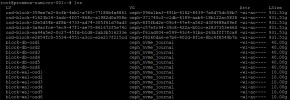Hey everyone, a common question in the forum and to us is which settings are best for storage performance. We took a comprehensive look at performance on PVE 7.2 (kernel=5.15.53-1-pve) with aio=native, aio=io_uring, and iothreads over several weeks of benchmarking on an AMD EPYC system with 100G networking running in a datacenter environment with moderate to heavy load.
Here's an overview of the findings:
Here's a link to full analysis with lots of graphs and data |https://kb.blockbridge.com/technote/proxmox-aio-vs-iouring/
tldr: The test data shows a clear and significant performance improvement that supports the use of IOThreads. Performance differences between aio=native and aio=io_uring were less significant. Except for unusual behavior reported in our results for QD=2, aio=native offers slightly better performance (when deployed with an IOThread) and gets our vote for the top pick.
attention: Our recommendation for aio=native applies to unbuffered, O_DIRECT, raw block storage only; the disk cache policy must be set to none. Raw block storage types include iSCSI, NVMe, and CEPH/RBD. For thin-LVM, anything stacked on top of software RAID, and file-based solutions (including NFS and ZFS), aio=io_uring (plus an IOThread) is preferred because aio=native can block in these configurations.
If you find this helpful, please let me know. I’ve got a bit more that I can share in the performance and tuning space. Questions, comments, and corrections are welcome.
Blockbridge : Ultra low latency all-NVME shared storage for Proxmox - https://www.blockbridge.com/proxmox
Here's an overview of the findings:
- iothreads significantly improve performance for most workloads.
- aio=native and aio=io_uring offer similar performance.
- aio=native has a slight latency advantage for QD1 workloads.
- aio=io_uring performance degrades in extreme load conditions.
Here's a link to full analysis with lots of graphs and data |https://kb.blockbridge.com/technote/proxmox-aio-vs-iouring/
tldr: The test data shows a clear and significant performance improvement that supports the use of IOThreads. Performance differences between aio=native and aio=io_uring were less significant. Except for unusual behavior reported in our results for QD=2, aio=native offers slightly better performance (when deployed with an IOThread) and gets our vote for the top pick.
attention: Our recommendation for aio=native applies to unbuffered, O_DIRECT, raw block storage only; the disk cache policy must be set to none. Raw block storage types include iSCSI, NVMe, and CEPH/RBD. For thin-LVM, anything stacked on top of software RAID, and file-based solutions (including NFS and ZFS), aio=io_uring (plus an IOThread) is preferred because aio=native can block in these configurations.
If you find this helpful, please let me know. I’ve got a bit more that I can share in the performance and tuning space. Questions, comments, and corrections are welcome.
Blockbridge : Ultra low latency all-NVME shared storage for Proxmox - https://www.blockbridge.com/proxmox
Last edited:








